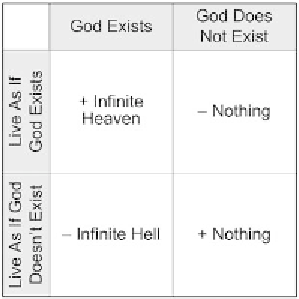Game Development Reference
In-Depth Information
He created a decision matrix (Figure 7.1) much like what we have seen in
Matching Pennies and Prisoner's Dilemma. In this case, one question was whether
or not God does indeed exist. Admittedly, we cannot determine the probability for
this—much like we couldn't determine the likelihood of our friend turning up
heads or tails. As we will see, using Pascal's logic, this turns out not to matter all that
much.
FIGURE 7.1
The scoring matrix for Pascal's Wager. Pascal used these options
and outcomes to determine that it was better to live as if God exists.
The other side of the grid involves “our play�? in the game. We are trying to
decide what to do. His two choices were:
Live as if God exists (e.g., believe, follow the rules, etc.)
Live as if God doesn't exist
His payoff matrix was based on his understanding of what was at stake. This
speaks more to Pascal's reminder that we need to know what is being wagered and
what is on the line.
Walking through the grid, we can infer Pascal's thought process. The most
obvious possible outcome is the upper left. If we live as if God exists and it turns out
that he
does
exist, we achieve eternal life in Heaven. That is, the payout is +
∞
. On
the other hand, if God exists and we life a… shall we say… less than exemplary life,
we would be damned to hell for all eternity (or variations on that theme). The
payout is -
∞
. The interesting part comes in the right-hand column of the matrix.
If God does
not
exist, then it doesn't matter. We lose nothing by living well; we gain
nothing by living wild and free. For all intents and purposes those can be expressed
by -0 and +0.



